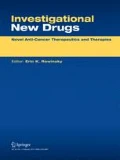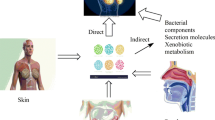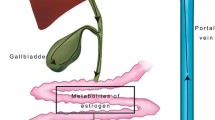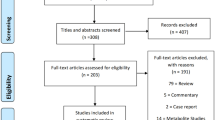Summary
Breast cancer is the most diagnosed cancer in women. It significantly impairs a patient’s physical and mental health. Gut microbiota comprise the bacteria residing in a host’s gastrointestinal tract. Through studies over the last decade, we now know that alterations in the composition of the gut microbiome are associated with protection against colonization by pathogens and other diseases, such as diabetes and cancer. This review focuses on how gut microbiota can affect breast cancer development through estrogen activity and discusses the types of bacteria that may be involved in the onset and the progression of breast cancer. We also describe potential therapies to curtail the risk of breast cancer by restoring gut microbiota homeostasis and reducing systemic estrogen levels. This review will further explore the relationship between intestinal microbes and breast cancer and propose a method to treat breast cancer by improving intestinal microbes. We aimed at discovering new methods to prevent or treat BC by changing intestinal microorganisms.



Similar content being viewed by others
Data availability
We declare that data supporting article results reported in the article is in the published articles.
References
Kwa M, Plottel CS, Blaser MJ, Adams S (2016) The intestinal microbiome and estrogen receptor-positive female breast cancer. J Natl Cancer Inst 108:djw029. https://doi.org/10.1093/jnci/djw029
Akram M, Iqbal M, Daniyal M, Khan AU (2017) Awareness and current knowledge of breast cancer. Biol Res 50:33. https://doi.org/10.1186/s40659-017-0140-9
Fernández MF, Reina-Pérez I, Astorga JM, Rodríguez-Carrillo A, Plaza-Díaz J, Fontana L (2018) Breast cancer and its relationship with the microbiota. Int J Environ Res Public Health 15:1747. https://doi.org/10.3390/ijerph15081747
Fuhrman BJ, Feigelson HS, Flores R, Gail MH, Xu X, Ravel J, Goedert JJ (2014) Associations of the fecal microbiome with urinary estrogens and estrogen metabolites in postmenopausal women. J Clin Endocrinol Metab 99:4632–4640. https://doi.org/10.1210/jc.2014-2222
Routy B, Le Chatelier E, Derosa L et al (2018) Gut microbiome influences efficacy of PD-1-based immunotherapy against epithelial tumors. Science 359:91–97. https://doi.org/10.1126/science.aan3706
Guerra L, Guidi R, Frisan T (2011) Do bacterial genotoxins contribute to chronic inflammation, genomic instability and tumor progression? FEBS J 278:2784577–2784588. https://doi.org/10.1111/j.1742-4658.2011.08125.x
Goodwin AC, Destefano SCE, Wu S et al (2011) Polyamine catabolism contributes to enterotoxigenic Bacteroides fragilis-induced colon tumorigenesis. Proc Natl Acad Sci U S A 108:15354–15359. https://doi.org/10.1073/pnas.1010203108
Clevers H, Nusse R (2012) Wnt/β-catenin signaling and disease. Cell 149:1192–1205. https://doi.org/10.1016/j.cell.2012.05.012
Iida N, Dzutsev A, Stewart CA et al (2013) Commensal bacteria control cancer response to therapy by modulating the tumor microenvironment. Science 342:967–970. https://doi.org/10.1126/science.1240527
Yang J, Tan Q, Fu Q et al (2017) Gastrointestinal microbiome and breast cancer: correlations, mechanisms and potential clinical implications. Breast Cancer 24:220–228. https://doi.org/10.1007/s12282-016-0734-z
Sampsell K, Hao D, Reimer RA (2020) The gut microbiota: a potential gateway to improved health outcomes in breast cancer treatment and survivorship. Int J Mol Sci 21:9239. https://doi.org/10.3390/ijms21239239
Ecker BL, Lee JY, Sterner CJ et al (2019) Impact of obesity on breast cancer recurrence and minimal residual disease. Breast Cancer Res 21:41. https://doi.org/10.1186/s13058-018-1087-7
Turnbaugh PJ, Hamady M, Yatsunenko T et al (2009) A core gut microbiome in obese and lean twins. Nature 457:480–484. https://doi.org/10.1038/nature07540
Iyengar NM, Hudis CA, Dannenberg AJ (2015) Obesity and cancer: local and systemic mechanisms. Annu Rev Med 66:297–309. https://doi.org/10.1146/annurev-med-050913-022228
Hildebrandt MA, Hoffmann C, Sherrill-Mix SA et al (2009) High-fat diet determines the composition of the murine gut microbiome independently of obesity. Gastroenterology 137:1716–24.e1–2. https://doi.org/10.1053/j.gastro.2009.08.042
Schnabl B, Brenner DA (2014) Interactions between the intestinal microbiome and liver diseases. Gastroenterology 146:1513–1524. https://doi.org/10.1053/j.gastro.2014.01.020
Mutlu EA, Gillevet PM, Rangwala H et al (2012) Colonic microbiome is altered in alcoholism. Am J Physiol Gastrointest Liver Physiol 302:G966–G978. https://doi.org/10.1152/ajpgi.00380.2011
Yan AW, Fouts DE, Brandl J et al (2011) Enteric dysbiosis associated with a mouse model of alcoholic liver disease. Hepatology 53:96–105. https://doi.org/10.1002/hep.24018
Rea D, Coppola G, Palma G et al (2018) Microbiota effects on cancer: from risks to therapies. Oncotarget 9:17915–17927. https://doi.org/10.18632/oncotarget.24681
Plottel CS, Blaser MJ (2011) Microbiome and malignancy. Cell Host Microbe 10:324–335. https://doi.org/10.1016/j.chom.2011.10.003
Ervin SM, Li H, Lim L (2019) Gut microbial β-glucuronidases reactivate estrogens as components of the estrobolome that reactivate estrogens. J Biol Chem 294:18586–18599. https://doi.org/10.1074/jbc.RA119.010950
Creely SJ, McTernan PG, Kusminski CM, Fisher M, da Silva NF, Khanolkar M, Evans M, Harte AL, Kumar S (2007) Lipopolysaccharide activates an innate immune system response in human adipose tissue in obesity and type 2 diabetes. Am J Physiol Endocrinol Metab 292:E740–E747. https://doi.org/10.1152/ajpendo.00302.2006
Gutiérrez A, Francés R, Amorós A et al (2009) Cytokine association with bacterial DNA in serum of patients with inflammatory bowel disease. Inflamm Bowel Dis 15:508–514. https://doi.org/10.1002/ibd.20806
Kamel M, Shouman S, El-Merzebany M et al (2012) Effect of tumour necrosis factor-alpha on estrogen metabolic pathways in breast cancer cells. J Cancer 3:3310–3321. https://doi.org/10.7150/jca.4584
Goedert JJ, Jones G, Hua X et al (2015) Investigation of the association between the fecal microbiota and breast cancer in postmenopausal women: a population-based case-control pilot study. J Natl Cancer Inst 107:djv147. https://doi.org/10.1093/jnci/djv147
Flores R, Shi J, Fuhrman B et al (2012) Fecal microbial determinants of fecal and systemic estrogens and estrogen metabolites: a cross-sectional study. J Transl Med 10:253. https://doi.org/10.1186/1479-5876-10-253
Jean MB, Luu HT, Dravet F et al. (2015) Relationship between intestinal microbiota and clinical characteristics of patients with early stage breast cancer. FASEB J 29. https://doi.org/10.1096/fasebj.29.1_supplement.914.2
Luu TH, Michel C, Bard J-M, Dravet F, Nazih H, Bobin-Dubigeon C (2017) Intestinal proportion of Blautia sp. is associated with clinical stage and Histoprognostic grade in patients with early-stage breast Cancer. Nutr Cancer 69:267–275. https://doi.org/10.1080/01635581.2017.1263750
Shi J, Geng C, Sang M, Gao W, Li S, Yang S, Li Z (2019) Effect of gastrointestinal microbiome and its diversity on the expression of tumor-infiltrating lymphocytes in breast cancer. Oncol Lett 17:5050–5056. https://doi.org/10.3892/ol.2019.10187
Harris RE, Casto BC, Harris ZM (2014) Cyclooxygenase-2 and the inflammogenesis of breast cancer. World J Clin Oncol 5:677–692. https://doi.org/10.5306/wjco.v5.i4.677
Bhattacharjee RN, Timoshenko AV, Cai J, Lala PK (2010) Relationship between cyclooxygenase-2 and human epidermal growth factor receptor 2 in vascular endothelial growth factor C up-regulation and lymphangiogenesis in human breast cancer. Cancer Sci 101:2026–2032. https://doi.org/10.1111/j.1349-7006.2010.01647.x
Subbaramaiah K, Morris PG, Zhou XK, Morrow M, Du B, Giri D, Kopelovich L, Hudis CA, Dannenberg AJ (2012) Increased levels of COX-2 and prostaglandin E2 contribute to elevated aromatase expression in inflamed breast tissue of obese women. Cancer Discov 2:356–365. https://doi.org/10.1158/2159-8290.CD-11-0241
Kennedy BM, Harris RE (2018) Cyclooxygenase and lipoxygenase gene expression in the inflammogenesis of breast cancer. Inflammopharmacology 26:909–923. https://doi.org/10.1007/s10787-018-0489-6
Krzeslak A, Wojcik-Krowiranda K, Forma E, Jozwiak P, Romanowicz H, Bienkiewicz A, Brys M (2012) Expression of GLUT1 and GLUT3 glucose transporters in endometrial and breast cancers. Pathol Oncol Res 18:721–728. https://doi.org/10.1007/s12253-012-9500-5
Hudson AG, Gierach GL, Modugno F, Simpson J, Wilson JW, Evans RW, Vogel VG, Weissfeld JL (2008) Nonsteroidal anti-inflammatory drug use and serum total estradiol in postmenopausal women. Cancer Epidemiol Biomark Prev 17:680–687. https://doi.org/10.1158/1055-9965.EPI-07-2739
Yoshinaka R, Shibata M-A, Morimoto J, Tanigawa N, Otsuki Y (2006) COX-2 inhibitor celecoxib suppresses tumor growth and lung metastasis of a murine mammary cancer. Anticancer Res 26:4245–4254. https://doi.org/10.1002/jsfa.1610
Miglietta A, Toselli M, Ravarino N et al (2010) COX-2 expression in human breast carcinomas: correlation with clinicopathological features and prognostic molecular markers. Expert Opin Ther Targets 14:655–664. https://doi.org/10.1517/14728222.2010.486792
Pellegrini M, Ippolito M, Monge T et al (2020) Gut microbiota composition after diet and probiotics in overweight breast cancer survivors: a randomized open-label pilot intervention trial. Nutrition 74:110749. https://doi.org/10.1016/j.nut.2020.110749
van Beurden YH, de Groot PF, van Nood E et al (2017) Clostridium difficile complications, effectiveness, and long term follow-up of fecal microbiota transfer by nasoduodenal tube for treatment of recurrent infection. United European Gastroenterol J 5:868–879. https://doi.org/10.1177/2050640616678099
Liu Y, Yu C, Wu Y, Sun X, Su Q, You C, Xin H (2017) CD44+ fibroblasts increases breast cancer cell survival and drug resistance via IGF2BP3-CD44-IGF2 signalling. J Cell Mol Med 21:1979–1988. https://doi.org/10.1111/jcmm.13118
Acknowledgements
We appreciated Luca Tamagnone at Università Cattolica del Sacro Cuore (Rome, Italy) for his advice and support.
Funding
This study was funded by National Natural Science Foundation of China (81872412); This study was funded by the Innovation Fund Designated for Graduate Students of Yangtze University Health Science Center (2020007).
Author information
Authors and Affiliations
Contributions
Authors contributed to this paper with the design (ZPF, ZY and HWX), literature search (ZPF and CGL), drafting (ZPF), revision (ZPF, HYX, ZWZ, CGL, ZY, HY and HWX), editing (ZPF, HYX, ZWZ, CGL, ZY, HY and HWX) and final approval (ZY, HY and HWX).
Corresponding authors
Ethics declarations
Conflict of interest
Author Zhi-Peng Feng declares that he has no conflict of interest. Author Hong-Yi Xin declares that he has no conflict of interest. Author Ze-Wei Zhang declares that he has no conflict of interest. Author Chen-Guang Liu declares that he has no conflict of interest. Author Zheng Yang declares that he has no conflict of interest. Author Zheng-Yang declares that he has no conflict of interest. Author Hua You declares that he has no conflict of interest. Author Hong-Wu Xin declares that he has no conflict of interest.
Ethical approval
This article does not contain any studies with human participants or animals performed by any of the authors.
Consent for publication
We declare that all authors agreed to publish the manuscript at this journal based on the signed Copyright Transfer Agreement and followed publication ethics.
Code availability
Not applicable.
Additional information
Publisher’s note
Springer Nature remains neutral with regard to jurisdictional claims in published maps and institutional affiliations.
Rights and permissions
About this article
Cite this article
Feng, ZP., Xin, HY., Zhang, ZW. et al. Gut microbiota homeostasis restoration may become a novel therapy for breast cancer. Invest New Drugs 39, 871–878 (2021). https://doi.org/10.1007/s10637-021-01063-z
Received:
Accepted:
Published:
Issue Date:
DOI: https://doi.org/10.1007/s10637-021-01063-z




